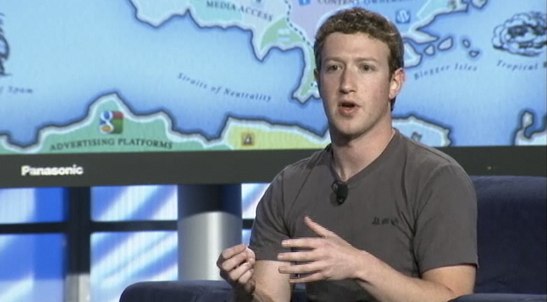Facebook's Zuckerberg: Social is here to stay; "Get on the bus"

In the physical world, what's mine is mine but in the online social world - namely Facebook - the rules of ownership are a bit more blurry.
The final sit-down chat of the day at the Web 2.0 Summit in San Francisco featured Facebook CEO Mark Zuckerberg, who started his session by replaying yesterday's announcement around Facebook Messages.
But the topics of conversation quickly moved forward, with discussions around where social is going. Zcukerberg, of course, sees the social graph growing over time. His take: over the next five years, almost every product vertical is going to be social, "Get on the bus," he said, speaking to naysayers who are resisting.
Facebook is growing and the rise in mobile usage is driving it even more. And its users are faithful - with more than 50 percent of the more than 500 million users checking in daily.
There was an interesting question offered to Zuckerberg, however, about some privacy issues. It seems that Facebook seems to operate under the practice of asking for forgiveness instead of permission. Zuckerberg didn't answer the question directly but did note that Facebook has a number of debates internally on the topic.

Take, for example, the co-ownership of photos among friends. If it's my photo, I own it. But if you're tagged in it, don't you have certain rights to it, as well. That's one of the grey areas.
Zuckerberg said the company is trying to give users control but also suggested that, through a two-way, bi-directional relationship, that "friends" have certain rights to each others data. Then wouldn't that also suggest email addresses, which Facebook won't allow to be exported?
He admits that there are some unresolved issues in the industry and that Facebook is trying to come up with solutions and propose them. The question that followed suggested that, with Washington taking interest in the business and its privacy policies, Facebook can't just tell lawmakers that they're still trying to figure them out.
During the conversation, it was suggested that Internet companies should push the boundaries and force lawmakers and regulators to discuss and debate the topics in front of them before they set rules and hold back innovation.
That's not a bad idea.
As the CEO, he has definitely made mistakes, he said, and has had to ask for forgiveness. The Facebook story, he said, is a great example of how building a product that people love will allow you to make some mistakes. If they love it, they stick with you - and that's clearly what's happened with Facebook.
Finally, one of his closing thoughts was about moving fast and being bold, open to taking risks, as a way of staying innovative and fresh. One thought that stayed with me - and should be remembered by start-ups out there.
He noted that technology companies are different from other companies that scale. Coca-Cola, for example, gets bigger as it grows from both a business and financial perspective. Tech companies, though, tend to get slower as they get bigger and, before you know it, they're being threatened and replaced by smaller companies that are more versatile.
Somewhere out there, there's a creative entrepreneur who is rethinking and building the whole experience from scratch. Some incumbents are versatile enough to adjust their businesses and survive while others may not.
A video clip from this conversation will be available later this week. We’ll embed it when the conference organizers release it. A livestream of the events is being made available by conference organizers.
More Conversations from Web 2.0 Summit:
- Carol Bartz on what Yahoo is - and, more importantly, what it isn't
- RIM's Balsillie on Playbook, Apple and "appification" of Web
- WebOS on track to make HP a mobile contender by next year
- Adobe CEO talks Apple, Flash, HTML5
- Google's Schmidt talks payments, mobile, TV and more to kick off Web 2.0 Summit